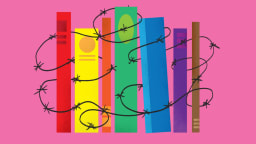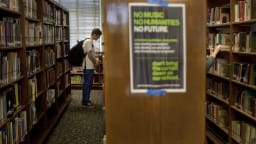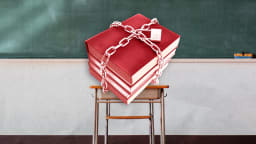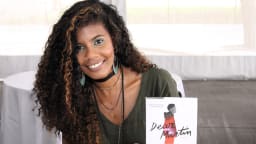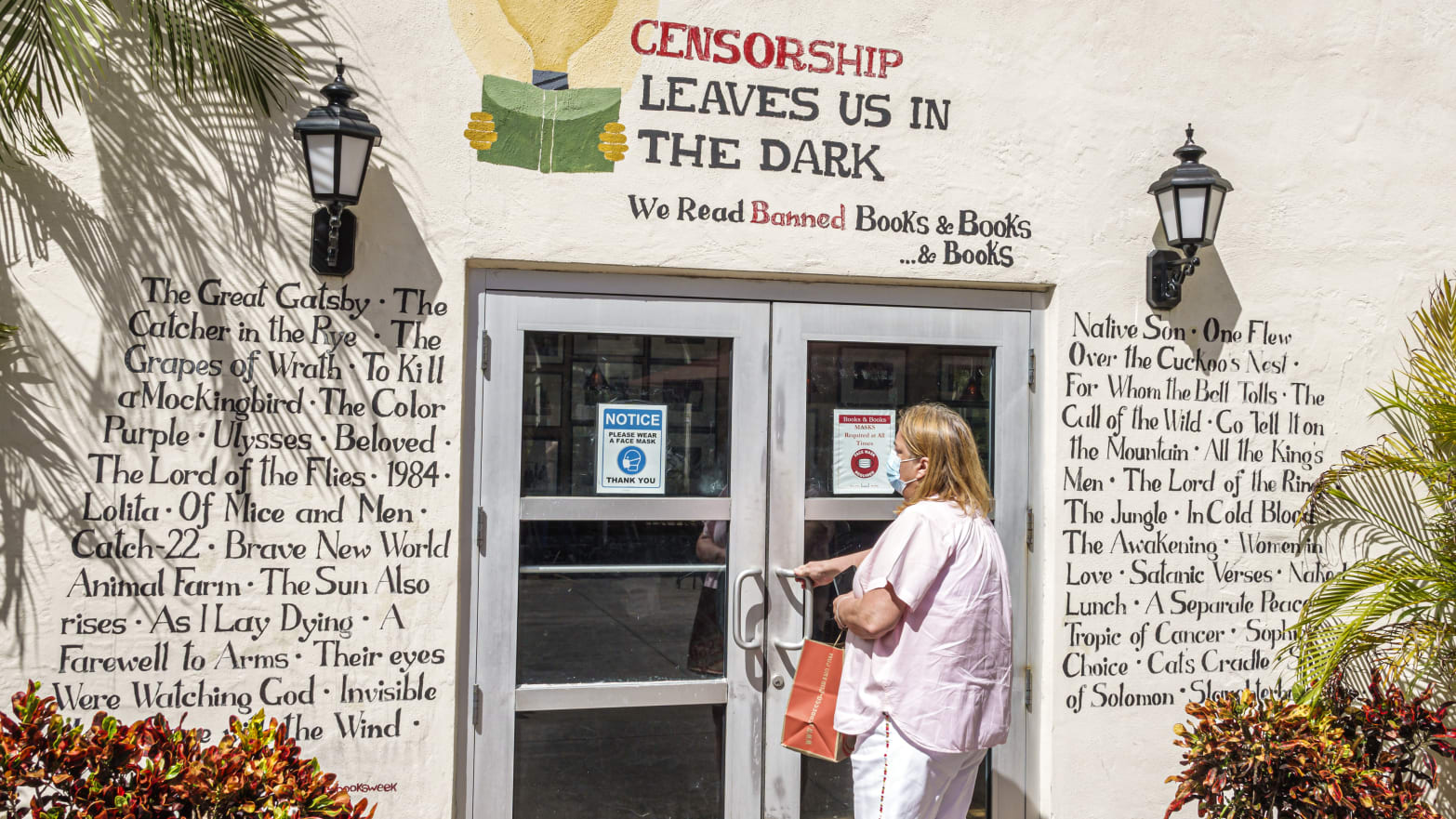
More than 1,600 different books were banned from schools and public libraries during the last academic year, as parents and community members across the country continued to raise hell over works that address cultural identities, racism, homophobia, and abuse.
Many of the pro-book banners insist the material is simply too inappropriate for younger readers. But authors say those concerns are just excuses—and it’s really about exclusion.
“They act like they’re concerned for the kids, but they’re not,” said Ellen Hopkins, the author of Crank, Tricks, People Kill People, and many other challenged books. “By saying, ‘Books on LGBTQ content can’t be there,’ they’re not only saying these kids don’t count. They’re saying they shouldn’t exist.”
Hopkins is the most frequently banned writer in the U.S., according to a new report by PEN America.
The report was released in conjunction with Banned Books Week, which began Sunday and is organized by groups dedicated to promoting free expression in the U.S.
It provides insight into book bans across the country, revealing that there were over 2,500 bans across 140 school districts during the previous academic year, affecting 1,648 titles by 1,261 different authors. An index in the report also shows the locations of each book ban, along with who challenged the book. Texas banned the most books, followed by Florida and then Pennsylvania. The report, which was released Monday, illustrates just how prevalent bans have become, driving wedges in local communities.
In an interview with The Daily Beast, Hopkins said she would love to have a constructive dialogue with parents and community members who are hesitant about her books, but they typically avoid the conversation.
Hopkins’ writing career was inspired by her own life. She began writing her first book, Crank, after watching her daughter, who was once the “perfect kid,” struggle. The story, which is written like a poem, details the downfall of a teen and the choices she’s forced to make between drug use, teenage parenting, prostitution, and homelessness.
“[My daughter] went to church, she was a straight-A kid. She had everything going for her,” Hopkins said. “She met a guy and her life, her dreams, were gone at 18 years old… So, if I could turn one kid off from that path, I would [be] happy.”
In Tricks, a novel about human trafficking, Hopkins took a similar approach.
“I worked with Las Vegas vice,” she told The Daily Beast. “I was talking to kids on the street in Las Vegas. They’re trafficking kids in front of all those big, beautiful casinos.”
Hopkins said it’s better to address issues rather than ignore them and pretend they don’t exist, as her opponents are trying to do.
“To say this stuff won’t happen if they don’t read about it, I mean, I just don’t even know where the logic is,” she said.
Hopkins has helped raise her grandchildren and has been inspired to write a number of novels based upon her family’s experiences. She has expanded her work into school presentations where she shares the stories with students in a learning environment.
“I’m not there to hurt kids. I’m there to help them,” she said. “I’m there to help them make better choices, better decisions. And that’s my whole point to writing.”
Ashley Hope Pérez, whose book Out of Darkness has been banned in 24 U.S. school districts, is a former high school English teacher and current literature professor at The Ohio State University. She said more book banners should be willing to read literature in full in order to understand the context.
“Let’s have a conversation about why would an author make these choices,” she told The Daily Beast. “I’m just, like, blown away by the refusal to read. These folks are not reading the books and, even if they’re reading passages from the book, they would fail my 10th grade English class. They certainly would fail my world literature class because context matters. Any given passage is part of a literary whole.”
Out of Darkness, a novel about the New London School explosion in 1930s Texas, incorporates some of Pérez’s own experiences.
“With Out of Darkness…I wrote this novel, in part, because I saw what silencing painful history does to communities,” she said. “It’s maddening to me because we know that access to literature that represents an experience—that maybe young people don’t have words for—is helpful with being able to name that harm.”
Both Hopkins and Pérez said they have been accused of ulterior motives to hurt children.
“I’m not there to hurt anybody,” Hopkins said. “I’m there to help these kids find their way into a better future. That is my whole point. That’s all.”
According to the PEN list, Hopkins is the author most frequently banned, with 43 bans. Gender Queer by Maia Kobabe, the second most banned author, is the most banned book. The memoir has been pulled from 41 districts, according to the report. Next comes All Boys Aren’t Blue by George M. Johnson and Pérez’s Out of Darkness.
“The data underscore the increasingly rapid pace at which whole categories of books—especially those featuring protagonists of color, dealing with issues of race, or highlighting LGBTQ+ characters and themes—are being pulled from shelves in classrooms and school libraries,” the report states.
“This censorious movement is turning our public schools into political battlegrounds, driving wedges within communities, forcing teachers and librarians from their jobs, and casting a chill over the spirit of open inquiry and intellectual freedom that underpin a flourishing democracy,” PEN America chief executive officer Suzanne Nossel said after the report was conducted. “This goes far beyond organic expressions of concern.”
The Daily Beast previously reported that a new compliance rule had a Texas school district pull dozens of books ahead of the 2022-23 school year, including the Bible and an adaptation of the Diary of Anne Frank. In August, a teacher in Oklahoma resigned after a law passed that said teachers should not make cisgender white children feel uncomfortable. In May, a school district in Ohio banned a historical novel for its “sex and wickedness.”
The restrictions come after far-right pundits began to campaign against critical race theory classrooms. The bans haven’t been limited to literature, as even math textbooks have come under fire.
As parents and community members continue to wage a political war against school districts and libraries, Hopkins said the harm ultimately falls on the kids, who need to feel heard and understood.
Pérez agreed that it’s detrimental when young people have resources available but they may not have access.
“What’s perhaps the most painful for me and for other writers,” she said, “we write these books because we believe the stories that we’re getting onto the shelf for young people matter to them, that they give them perspectives that they wouldn’t have, they give them access to elements of our history they wouldn't have, they allow them to imagine experiences of their classmates or people.”
By Brooke Leigh Howard Reporter Published Sep. 22, 2022 5:35PM ET

